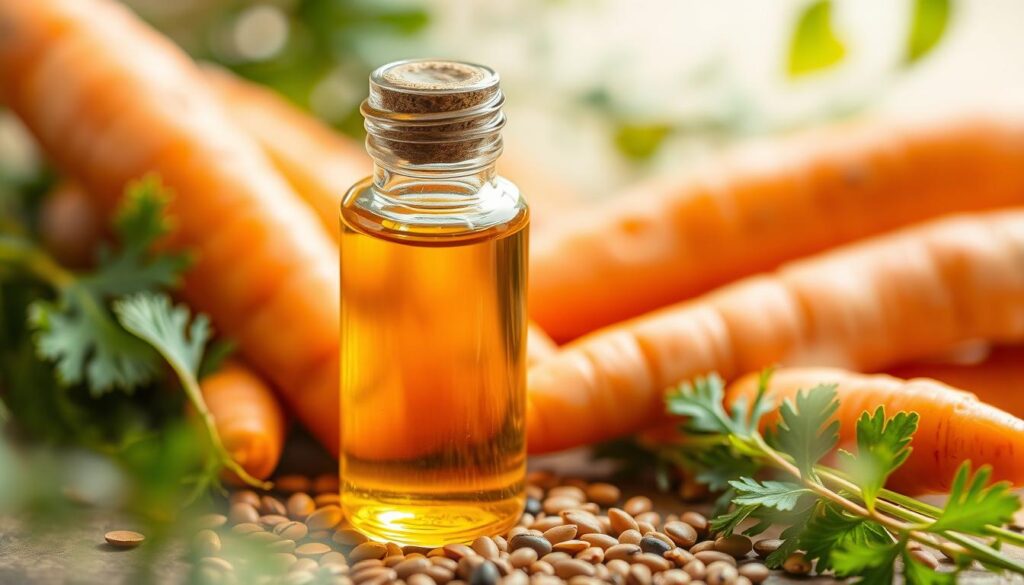Walking through my local farmers’ market, I saw vibrant orange carrots. Their smell reminded me of my grandmother’s kitchen, where she made herbal remedies. I learned that carrot seeds hold a powerful essential oil, changing natural skincare and aromatherapy.
Carrot seed oil is more than a trendy item. It’s a strong ally for health, with science to back it up. It fights bacteria and skin issues, making it a hit in wellness circles. For me, it’s a key part of my skincare.
So, what makes this oil stand out? Is it the same as cooking carrot oil? How can we use it best? These questions led me to explore carrot seed oil further. I’m excited to share what I’ve learned with you, whether you’re into skincare or natural remedies.
Key Takeaways
- Carrot seed oil is extracted through steam distillation of seeds
- It possesses antibacterial properties against certain strains
- The oil contains umbelliferone, a natural UV absorber
- It’s commonly used in various skincare products
- Carrot seed oil may help with skin conditions like eczema
- It should be diluted before applying to the skin
- The oil shows promising antioxidant and anti-inflammatory effects
What is Carrot Seed Oil?
Carrot seed oil comes from the Daucus carota plant, also known as Queen Anne’s lace. It has been used for centuries by many cultures. It’s a key part of botanical skin care.
Defining Carrot Seed Essential Oil
This oil is made by steam distilling the seeds of the Daucus carota plant. It looks light yellow and smells warm, sweet, and fresh. It’s known for its high carotol content, up to 70%.
Distinguishing from Carrot Oil and Cold-Pressed Carrot Seed Oil
It’s key to know the difference between carrot seed essential oil and other carrot oils:
- Carrot oil: Made by soaking crushed carrot roots in a carrier oil
- Cold-pressed carrot seed oil: Mainly used in cosmetics
Botanical Origins: Daucus Carota Plant
The Daucus carota plant, or wild carrot, is where carrot seed oil comes from. It has white flowers and smells like carrots. For centuries, it has been used in many cultures, including Roman, Greek, French, Indian, and Egyptian.
Carrot seed oil mixes well with oils like lavender, juniper berry, lime, and cedarwood. It’s used in aromatherapy and skincare products. It’s known to keep skin young, help with menstruation, reduce stress, and improve digestion.
The Composition of Carrot Seed Oil
Carrot seed oil is packed with compounds that make it beneficial. It has a mix of elements that make it special and useful.
The oil is made up of several important parts:
- Alpha-pinene: Known for its antibacterial properties
- Carotol: Exhibits antifungal effects
- Umbelliferone: Absorbs UVB light

Carrot seed oil doesn’t have the same vitamins as carrots but has other good stuff. It makes about 0.83% essential oil and 7.84% edible oil from carrot seeds.
Now, let’s explore the main fatty acids in carrot seed oil:
| Fatty Acid | Percentage |
|---|---|
| Petroselinic acid | 59.35% |
| Linoleic acid | 11.82% |
| Palmitic acid | 10.01% |
| Stearic acid | 2.41% |
The essential oil from carrot seeds has carotol (66.78%), daucol (8.74%), and (Z,Z)-α-farnesene (5.86%) as main parts. Carrot seed oil isn’t a big source of vitamin A or carotene. But, it has a special mix of compounds for health and beauty uses.
Health Benefits of Carrot Seed Oil
Carrot seed oil is packed with health benefits, making it a great choice for natural wellness. Its versatile properties are impressive, from fighting harmful microbes to protecting our cells.
Antibacterial Properties
The oil’s antibacterial effects stand out. It has alpha-pinene, a compound that fights E. coli, salmonella, and candida. This makes carrot seed oil great for preventing infections and boosting overall health.
Antifungal Effects
Carrot seed oil also fights fungi. It’s effective against various yeasts, keeping the body’s microbiome in balance. This is great for skin and digestive health.
Antioxidant Capabilities
Carrot seed oil is a strong antioxidant. It shields our cells from damage by free radicals. Studies show it can protect the liver, making it a key part of staying healthy.

Potential Anti-Cancer Properties
Research hints at carrot seed oil’s anti-cancer effects. It might help fight breast, leukemia, and colon cancer cells. Even animal studies show promise against skin cancer. More research is needed, but the results are promising.
Carrot seed oil also moisturizes the skin, improving its health. It makes skin soft and protects it when applied on the skin. Some studies suggest it could even act like sunscreen, offering SPF protection when mixed with other herbs.
| Benefit | Application |
|---|---|
| Antibacterial | Fights E. coli, salmonella, candida |
| Antifungal | Balances microbiome |
| Antioxidant | Protects cells, supports liver health |
| Anti-Cancer | Potential effects on various cancer types |
| Skin Health | Moisturizes, protects, potential SPF |
Skincare and Beauty Applications
Carrot seed oil is a gem in plant-based skincare. It’s packed with vitamins and acts as a natural moisturizer. It fights aging and protects against the sun thanks to its vitamin A.
When I looked into it, I saw it works well with other plant extracts. For a sun protection blend, combine 3 tablespoons of carrot oil with ylang ylang essential oil. This mix makes a great suntan oil that also nourishes the skin.
For older skin, carrot seed oil’s antioxidants help slow aging. I suggest using it every day or as a weekly mask with avocado oil. It’s also good for dry or sensitive skin. Add it to musk rose or borage oil to calm sensitivity, or mix with shea butter for very dry skin.
Carrot seed oil does more than moisturize. It smooths out wrinkles, fixes sun damage, and reduces scars. It also fights infections and conditions like eczema with its anti-fungal and antibacterial properties. Regular use can greatly improve skin health and look.
Leave a Reply
You must be logged in to post a comment.